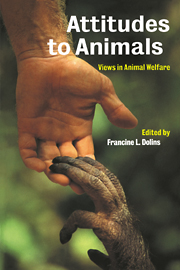Book contents
- Frontmatter
- Contents
- List of contributors
- Acknowledgements
- Part I Attitudes to animals
- Part II Animal awareness
- Part III Animal welfare
- 9 Animal welfare: the concept of the issues
- 10 New perspectives on the design and management of captive animal environments
- 11 Should we let them go?
- Part IV Research and education
- Part V Epilogue: the future of wild animals
- Index
11 - Should we let them go?
Published online by Cambridge University Press: 16 November 2009
- Frontmatter
- Contents
- List of contributors
- Acknowledgements
- Part I Attitudes to animals
- Part II Animal awareness
- Part III Animal welfare
- 9 Animal welfare: the concept of the issues
- 10 New perspectives on the design and management of captive animal environments
- 11 Should we let them go?
- Part IV Research and education
- Part V Epilogue: the future of wild animals
- Index
Summary
Introduction
Is it wrong to keep animals in captivity? This is one of the questions often raised today, about the limits of our proper concern for animals. Many people now admit that we ought to have some such concern, but how far must it go? There is a natural wish for a definite terminus somewhere. The current search was presented in a television discussion not long ago. The philosopher Bernard Williams, when asked whether we owed any duty to animals, conceded at once that we do and said that it would be quite wrong to inflict pain on them. That, however, was where our responsibility ended. Nothing else (he said) could be expected of us. It would have been interesting to explore the reasons for this stance, to hear why extreme distress of other kinds mattered less than even mild pain. But, as does happen on these occasions, the talk veered off somewhere else. It may be worthwhile reflecting a bit further on the matter here. There seem to be three main reasons why many other people besides Williams might like to take this stance:
People want a clear, definite terminus, and pain seems especially definite because it is physical. It strikes people as not having anything vague or subjective about it.
Negative duties such as not inflicting pain seem limited and manageable, whereas positive ones such as producing happiness look infinite.
This stance still allows the killing of animals – provided that it is painless.
- Type
- Chapter
- Information
- Attitudes to AnimalsViews in Animal Welfare, pp. 152 - 164Publisher: Cambridge University PressPrint publication year: 1999



